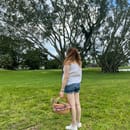When thinking about theatre, for a lot of people, there’s a specific image that comes to mind. From Shakespeare’s plays to Wicked to a high school performance of Into the Woods, theatre tends to be “predominantly white.” Globally, there’s an organization that starts conversations regarding this and creates educational resources about acting processes, specifically for black performers.
The Black Acting Methods Studio, founded by Executive Director Sharrell D. Luckett, has served as an inspiration for actors. Florida State University has a chapter under it called the Black Acting Methods Society (BAMS). I had an opportunity to talk with Amber Daniels, President of BAMS, about the chapter.
Daniels first found BAMS as an underclassman when she saw the organization’s table at an FSU School of Theatre event. She wasn’t super involved until she heard more about it from a friend who was serving on the executive board. In Daniels’ words, she realized she needed to “make it a priority to go.” She did and never looked back.
BAMS is an education-based organization. But for Daniels, it’s more than that. “Being the minority at a university can be a lot, especially in a performing arts program. It gives us the space to be able to come together, commune, and talk about the experiences that we’re having,” she says.
A meeting with the organization features a dissection of a chapter of Luckett’s book, Black Acting Methods: Critical Approaches. Acting, like any other craft, involves technique. Educational environments teach various methods and training techniques that different creators patent. Many of these teachings, however, were by white performers.
“It can be hard,” Daniels says, “when you’re going to a conservatory or BFA program, and they don’t know how to teach you because you’re Black. So basically, [Luckett] created a pedagogy of all these different methods and approaches to acting that resonate with Black culture, history, and ‘blackness’ for Black artists.”
As for the future of BAMS, Daniels has some bold ideas. In addition to continuing to meet and discuss Luckett’s book, as well as providing a safe space for Black performing artists at FSU, one of her larger goals is to build a connection between the Black artists at FSU and the Black artists at Florida A&M University to “create a bigger community of support for one another” and “mend that gap that’s happened.”
She also hopes to use BAMS as a way to put on shows, whether that’s through works written by established Black writers and playwrights, shows by Black FSU students, or the Black History Month showcase that she and the current board have been planning for future years. She doubled down on this, specifically saying that “[for] any Black artist who wants to put on their show and have it supported by other Black artists in a space where they feel safe and know they’re going to be supported in their process… I want them to bring it here.”
Long term, Daniels wants to change perspectives on acting for Black people. She says, “I won’t speak for everybody, but I’ll speak on my experience as a Black performer or a performer who is Black. When it comes to the community and the arts, it’s not as supported as the White community, and that just goes back to systematic racism. We didn’t have the luxury of being able to be artists.”
She explains that “just having dark skin is risky, so joining a career that’s [a bit] all over the place is just not something that other people can fathom.”
These conversations about “blackness” and its place in theatre, and finding one’s footing as a Black artist, are central to the mission of the Black Acting Methods Society at FSU. If you’re interested, their meetings are on Wednesdays at 7 p.m. Feel free to check out their Instagram page for more information!
Want to see more HCFSU? Be sure to like us on Facebook and follow us on Instagram, Twitter, TikTok, and Pinterest!


